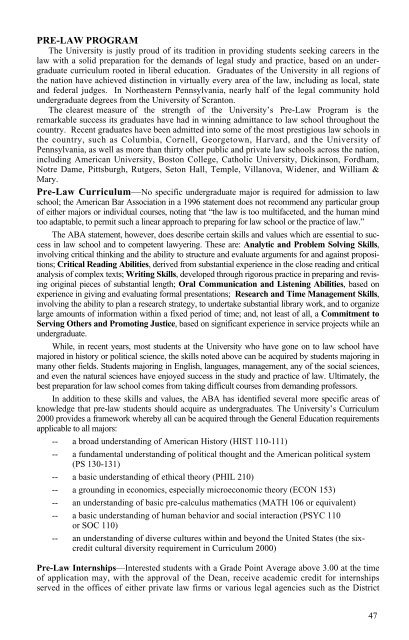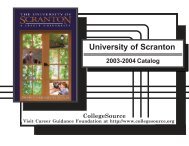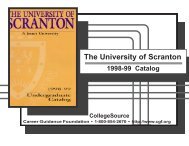Create successful ePaper yourself
Turn your PDF publications into a flip-book with our unique Google optimized e-Paper software.
PRE-LAW PROGRAM<br />
<strong>The</strong> <strong>University</strong> is justly proud <strong>of</strong> its tradition in providing students seeking careers in the<br />
law with a solid preparation for the demands <strong>of</strong> legal study and practice, based on an undergraduate<br />
curriculum rooted in liberal education. Graduates <strong>of</strong> the <strong>University</strong> in all regions <strong>of</strong><br />
the nation have achieved distinction in virtually every area <strong>of</strong> the law, including as local, state<br />
and federal judges. In Northeastern Pennsylvania, nearly half <strong>of</strong> the legal community hold<br />
undergraduate degrees from the <strong>University</strong> <strong>of</strong> <strong>Scranton</strong>.<br />
<strong>The</strong> clearest measure <strong>of</strong> the strength <strong>of</strong> the <strong>University</strong>’s Pre-Law Program is the<br />
remarkable success its graduates have had in winning admittance to law school throughout the<br />
country. Recent graduates have been admitted into some <strong>of</strong> the most prestigious law schools in<br />
the country, such as Columbia, Cornell, Georgetown, Harvard, and the <strong>University</strong> <strong>of</strong><br />
Pennsylvania, as well as more than thirty other public and private law schools across the nation,<br />
including American <strong>University</strong>, Boston College, Catholic <strong>University</strong>, Dickinson, Fordham,<br />
Notre Dame, Pittsburgh, Rutgers, Seton Hall, Temple, Villanova, Widener, and William &<br />
Mary.<br />
Pre-Law Curriculum—No specific undergraduate major is required for admission to law<br />
school; the American Bar Association in a 1996 statement does not recommend any particular group<br />
<strong>of</strong> either majors or individual courses, noting that “the law is too multifaceted, and the human mind<br />
too adaptable, to permit such a linear approach to preparing for law school or the practice <strong>of</strong> law.”<br />
<strong>The</strong> ABA statement, however, does describe certain skills and values which are essential to success<br />
in law school and to competent lawyering. <strong>The</strong>se are: Analytic and Problem Solving Skills,<br />
involving critical thinking and the ability to structure and evaluate arguments for and against propositions;<br />
Critical Reading Abilities, derived from substantial experience in the close reading and critical<br />
analysis <strong>of</strong> complex texts; Writing Skills, developed through rigorous practice in preparing and revising<br />
original pieces <strong>of</strong> substantial length; Oral Communication and Listening Abilities, based on<br />
experience in giving and evaluating formal presentations; Research and Time Management Skills,<br />
involving the ability to plan a research strategy, to undertake substantial library work, and to organize<br />
large amounts <strong>of</strong> information within a fixed period <strong>of</strong> time; and, not least <strong>of</strong> all, a Commitment to<br />
Serving Others and Promoting Justice, based on significant experience in service projects while an<br />
undergraduate.<br />
While, in recent years, most students at the <strong>University</strong> who have gone on to law school have<br />
majored in history or political science, the skills noted above can be acquired by students majoring in<br />
many other fields. Students majoring in English, languages, management, any <strong>of</strong> the social sciences,<br />
and even the natural sciences have enjoyed success in the study and practice <strong>of</strong> law. Ultimately, the<br />
best preparation for law school comes from taking difficult courses from demanding pr<strong>of</strong>essors.<br />
In addition to these skills and values, the ABA has identified several more specific areas <strong>of</strong><br />
knowledge that pre-law students should acquire as undergraduates. <strong>The</strong> <strong>University</strong>’s Curriculum<br />
2000 provides a framework whereby all can be acquired through the General Education requirements<br />
applicable to all majors:<br />
-- a broad understanding <strong>of</strong> American History (HIST 110-111)<br />
-- a fundamental understanding <strong>of</strong> political thought and the American political system<br />
(PS 130-131)<br />
-- a basic understanding <strong>of</strong> ethical theory (PHIL 210)<br />
-- a grounding in economics, especially microeconomic theory (ECON 153)<br />
-- an understanding <strong>of</strong> basic pre-calculus mathematics (MATH 106 or equivalent)<br />
-- a basic understanding <strong>of</strong> human behavior and social interaction (PSYC 110<br />
or SOC 110)<br />
-- an understanding <strong>of</strong> diverse cultures within and beyond the United States (the sixcredit<br />
cultural diversity requirement in Curriculum 2000)<br />
Pre-Law Internships—Interested students with a Grade Point Average above 3.00 at the time<br />
<strong>of</strong> application may, with the approval <strong>of</strong> the Dean, receive academic credit for internships<br />
served in the <strong>of</strong>fices <strong>of</strong> either private law firms or various legal agencies such as the District<br />
47
















